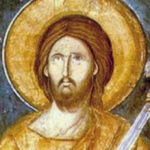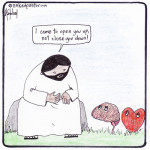We run our website the way we wished the whole internet worked: we provide high quality original content with no ads. We are funded solely by your direct support. Please consider supporting this project.

What Power Do You Trust?
Governments and nations have always relied on fighting to survive. They punish criminals who threaten their welfare. They go to war against enemies who attack their borders or stand in the way of their agenda. This is how the kingdoms of the world maintain law and order and advance their causes.
By contrast, the Kingdom that Jesus embodied and established refuses all violence, which is why Jesus pointed to his followers’ refusal to fight as proof to Pilate that his kingdom is not of this world. The kingdom he was establishing doesn’t wage war by using violence against enemies but by loving, serving, and healing enemies.
The fact is that no government or nation in history has ever looked remotely like Jesus. None has ever made it a policy not to forcefully resist enemies. None has ever committed itself to blessing criminals, serving enemies, and refusing to retaliate when people or nations do it wrong. Nor has any political regime ever established laws to return evil with good, turn the other check, or lend without expecting anything in return.
This is the reality of living in a fallen world. Any kingdom that refuses to punish criminals and defend itself would quickly fall apart. Scripture indicates that God uses the power of the sword wielded by governments to preserve law and order as much as possible (Rom 13:1-7). Even God, it seems, doesn’t expect governments to be “Christian.”
Yet this reinforces the point that Jesus’ Kingdom looks nothing like the kingdoms of the world, for if God expects anything of Jesus’ followers, it’s that they act “Christian.”
The difference between the Kingdom of God and the kingdom of the world comes down to the kind of power they trust.
The kingdoms of the world place their trust in whatever coercive power they can exercise over others. We can think of this kind of power as the power of the sword.
In contrast, the Kingdom of God refuses to use coercive power over people, choosing instead to rely exclusively on whatever power it can exercise under people. This is the transforming power of humble, self-sacrificial, Christlike love. Exercising power under others is about impacting people’s lives by serving them, sacrificing for them, and even be sacrificed by them while refusing to retaliate, as Jesus did. We can think of this kind of power as the power of the cross, for the cross is the purest expression of humble servant-like, self-sacrificial love.
While cross power may look weak next to sword power, it is, in fact, the greatest power in the universe. The power of the cross is the only power than can overcome evil rather than merely suppress it for a while. It’s the only power that can transform an enemy into a friend. It’s the power that God promises will ultimately transform the world. It’s the kind of power that the omnipotent God himself relied on when he came in the person of Jesus to overcome evil and redeem all of creation from its grip.
In a violent world filled with people vying for power over others, the Kingdom offers people the peacemaking beauty of Christlike power under people. The power of this distinctive is lost, however, whenever Kingdom of God people try to put their trust in both kingdoms at the same time. Then the Kingdom stops looking like Jesus and starts looking more like the kingdoms of this world. And this means that the Kingdom of God for all practical purposes simply ceases to exist.
Kingdom people are called out to be a holy, separate people. We’re called to be nonconformists, resisting the “pattern of the world” as we’re transformed into the image of Christ. As we do this, we put our trust in the power of Christlike love. This holy nonconformity, although difficult in politically troubling times like this, isn’t just one aspect of who we are—it’s the essence of who we are. It’s how we manifest the beauty of God’s character and Kingdom.
—Adapted from The Myth of a Christian Religion, pages 21-23
Photo credit: geatchy via Visual hunt / CC BY-NC
Category: General
Tags: Kingdom Living, Kingdom of God, Kingdom of this World, Love, Non-Violence, Politics, Power, Upside-Down Kingdom
Topics: Enemy-Loving Non-Violence
Related Reading

Why Did Jesus Command His Disciples to Arm Themselves With Swords? (podcast)
In this episode Greg looks at the command in Luke 22 to buy a sword. Episode 46 http://traffic.libsyn.com/askgregboyd/Episode_0046.mp3

What I – a Pacifist – Would say to Obama About the Crisis In Syria
Over the last week many of you have written ReKnew asking me to weigh in on the crisis in Syria. Does being a pacifist mean that I am opposed to America violently intervening to keep Assad from using chemical weapons against his own people? And if so, what would I say if Obama asked for…

Q&A: Condemning Sin
Q: I have a question about how you answer the rare occasions when Jesus apparently felt it necessary to publicly condemn sin: like the cleansing of the temple and his very strong judgments on Pharisees and rulers in Matthew 23. Also John the Baptist who not only preached strongly regarding public sins but was imprisoned…

How Much Does the Cross Really Matter?
The cross is as foolishness and weakness to nonbelievers, but Paul wrote that to those who are being saved it is both “the power” and “wisdom of God” (1 Cor 1:18, 24). In sharp contrast to the controlling power and wisdom that has been ascribed to God or the gods throughout history—including in much of…

Christians and Creation Care
Image by Ali Inay While the mustard seed of the Kingdom has been planted, it obviously hasn’t yet taken over the entire garden (Matt 13:31-42). We continue to live in an oppressed, corrupted world. We live in the tension between the “already” and the “not yet.” Not only this, but we who are the appointed landlords…

